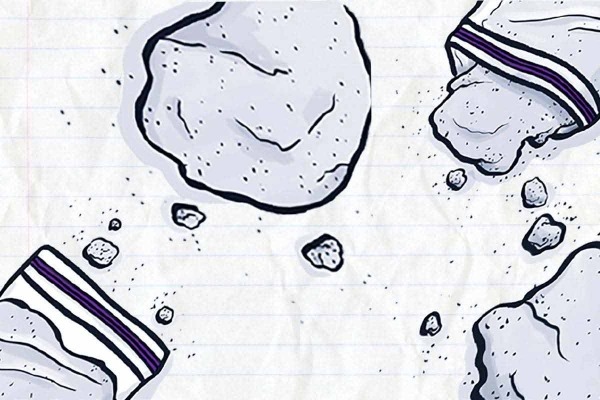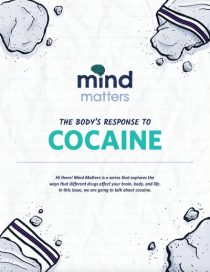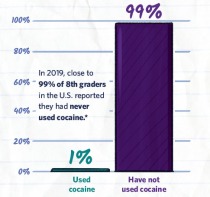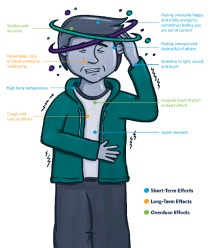A visually appealing booklet for students that explains how cocaine changes the way the communication centers in the brain work and ultimately cause their effects. This booklet is part of the Mind Matters series focused on easy-to-understand scientific facts.


Hi there! Mind Matters (formerly referred to as Mind Over Matter) is a series that explores the ways that different drugs affect your brain, body, and life. In this issue, we are going to talk about cocaine.
View the Mind Matters Teacher's Guide.
What is cocaine?
Cocaine is a drug that is made of dried leaves from the South American coca plant. Cocaine is also called other names like blow, coke, or snow.
Illegal cocaine looks like a very fine, white powder. Sometimes drug dealers mix it with flour or corn starch to increase profits.
Cocaine is a stimulant that can make you feel like you have more energy and are extra alert. But it can also make you feel restless, grouchy, anxious, panicked, and paranoid. It can even cause a heart attack, stroke, or coma.
Cocaine is mostly available as an illegal drug that some people use to get high. In rare cases, it is also used as a prescription drug for certain surgeries.
Learn more about cocaine.
How do people use cocaine?
People use cocaine by snorting the powder through their nose, or by rubbing it on their gums. They can also mix it with water and inject it into their body. Some people smoke cocaine that has been heated to make a rock crystal, called crack, which refers to the crackling sound as it's heated.
How does cocaine work?
Cocaine changes how the brain works by increasing the amount of a chemical called dopamine in parts of the brain that control reward and motivation. If you use it often, your brain will get used to the large amount of dopamine produced by the drug, and other healthy activities will seem less interesting or fun. You will want more and more of the drug just to feel normal.
Can you become addicted to cocaine?
Yes, you can. Over time, cocaine can change the way your brain works. If you stop, you can start to feel really sad and sick. This makes it hard to stop using cocaine. This is called addiction.
Anyone can become addicted to cocaine. It doesn’t matter where you live or what school you go to. There is no way to predict who will become addicted.
The right treatment can help someone who is addicted feel better and stop using cocaine, but it is hard work and takes many years to stay in recovery from addiction. The best approach is to never start using the drug in the first place.
Can cocaine affect your brain and body?
Short-Term Effects
- High body temperature
- Feeling unusually happy and wildly energetic; sometimes feeling you are out of control
- Feeling annoyed and distrustful of others
- Sensitive to light, sound, and touch
- Upset stomach
Long-Term Effects
- Nosebleeds, loss of smell, problems swallowing
- Cough and lung problems
Overdose Effects
- Strokes and seizures
- Irregular heart rhythm or heart attack
What if someone I know needs help?
If you think a friend or family member has a problem with drugs, talk to an adult you trust—like a parent, coach, or teacher—right away. Remember, treatment is available and people can get better.
* Johnston, et al. (2020). Monitoring the Future national survey results on drug use: 1975–2019: Overview, key findings on adolescent drug use. Ann Arbor: Institute for Social Research, The University of Michigan



